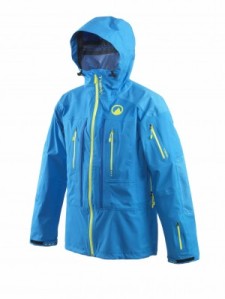You are currently browsing the category archive for the ‘snowboarding’ category.
Established, big companies in the outdoor sport business want to make a move towards a sustainable future. But there are several obstacles that slow this movement down. Sourcing of quality, eco-friendly material, research & development, necessary to come up with new innovative products from recycled or renewable resources, and developing new distribution channels and context-specific messaging are only a few factors that need to be understood. By now, it has become clear to many marketing managers, that “going green” does not necessarily create higher costs on the production side, but that it’s actually possible to produce high-performance, eco-friendly products at approximately the same costs
as conventional ones. Quality is also no issue! Snowboards’ or Skis’ edges from recycled steel, impregnated wooden side walls or topsheets laminated with environmentally friendly glue and natural colors, 20.000mm recycled polyester garments in bright colors, recyclable zippers, etc. – all these product components are available in high quality at only slightly higher prices. Zimtstern’s Dominik Fuß interviewed by ISPO in 2009: “We are already able to develop reasonably priced, eco-friendly products that don’t need to cost more!
But the outdoor sports companies are still hesitant to change their entire product line to become 100% sustainable. Besides – it’s no piece of cake. While smaller and more flexible “green” start-ups can focus on profitable niche-markets, changing the production process and marketing strategy, to offer such a portfolio within only few seasons, is next to impossible for the big global players. “I think, it’s a state of mind, which needs to change in the whole company – once it’s top of mind in everybody’s head, many people come up with ideas and solutions. But this change does not happen over night.” – Maritxu Darrigrand, Head of Sustainability at Roxy.
This philosophy needs to be established within entire companies in the coming years – but this will only work, if producers and retailers can trust consumer demand. (Most often, only top of the line products, often signature series of sponsored celebrity athletes, could demonstrate that, even at slightly higher costs, they still deliver an acceptable margin through price premiums.) Consumers like to claim their willingness to pay higher prices and often see themselves as conscious consumers, while the truth is, that price and other standard product attributes still influence the purchase decisions the most. And buying behavior is also affected by social norms and perceived obstacles. One of the main hypothesis of this project is that individuals with a strong outdoor sports background (surfing, climbing, snowboarding, etc.) have a stronger connection to nature and that this connection positively influences their decisions compared to other consumers.
This research project for the Department of Service and Technology Marketing of the Technical University of Munich, Germany, has been designed to understand those effects, identify problems and find solutions. The online-survey assesses the influences on end-consumers’ purchasing behavior for environmentally friendly products in the outdoor sports segment.
Link to the survey: http://www.unipark.de/uc/eco-friendly-outdoor-products/
Thank you in advance, for participating in the study! It will take less than 20 mins. of your time and your input will help to make a difference!
The results of this study will reach the heads of sustainability, marketing managers and product developers in a lot of big, internationally operating outdoor sports companies.
Thanks to our sponsors Völkl Snowboards and O’Neill, there are some nice eco-friendly products up for grabs!!
Don’t forget to check out the 7Sky GreenRoom and inform yourself about the BlueSign label.
 “When you go riding or surfing you are amidst nature most of the time and we have to be aware of what’s going on. I have been surfing all my life and I see the difference between now and back in the days. You have to be touched by what’s going on if you are connected to nature.” – Maritxu Darrigrand, Marketing Director at Roxy
“When you go riding or surfing you are amidst nature most of the time and we have to be aware of what’s going on. I have been surfing all my life and I see the difference between now and back in the days. You have to be touched by what’s going on if you are connected to nature.” – Maritxu Darrigrand, Marketing Director at Roxy
And that’s what the Roxy Chicken Jam 2010 was all about! It was one of the first carbon neutral boardsport events in Europe. Recent major events that have taken responsibility for their greenhouse gas emissions include: the 2007 Academy Awards, 2006 FIFA World Cup Soccer, and the Dave Matthews Band concert tour. The environmental leadership demonstrated by these events is helping to transform the event industry, with green initiatives quickly becoming an expected part of holding an event. Let’s hope the snowboarding industry – highly dependent on the earth’s climate – starts leading by example. Read the rest of this entry »


